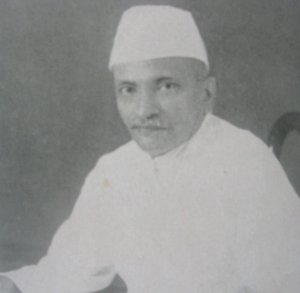Nagindas T. Master
A short slim man, with a boldly sculptured face, with a superb heart under the rough exterior, a wondrous pride yet noble withal, his capacity is sop precious that it amazes one. His Napoleonic theatricalities keep the strangers under a spell.
His mind is direct, and emphatic. It marches up to the enemies columns with bulldog courage and blows the lines into shreds. To come into handgrips with him is to court disaster.
K.L. Kamat/Kamat's Potpourri
Nagindas T. Master
His personality is piquant, his outlook bright and his conviction compelling. His career is an example of the lawyer succeeding in politics of a grand scale.
Mr. Nagindas. T. Master was born in 1875. He was sent to school where he showed signs of being what we should call a good student. His desire to excel quickly brought him into the front rank of students.
In 1885 he graduated from the Bombay University. He took his B.A., L.L.B degree in 1902 and passed the Solicitors examination in 1906. He reveled a marked interest in politics when the Home Rule movement was started. He carried on a raging campaign throughout the Presidency. In 1916 he was returned to the Bombay University Senate as a Fellow by the Registered Graduates Constituency. He was a member of the First Bar Council in Bombay. For many years he has been a member of the Committee of the Indian Merchants Chamber.
He rendered himself eminent in the Civil Disobedience Movement. He witnessed the historic sight of Gandhiji breaking the Salt Law at Dandi. As a chairman of the Boycott Committee he took a leading part in the promotion of Swadeshi. The work of the Boycott was so effective that three was a marked fall in the foreign imports. Even the doctors nobly responded to his call and avoided the prescription of foreign drugs.
He was appointed the President of the Tenth War Council. The Congress Committee was declared unlawful so he was arrested and sentenced to six months imprisonment. After his release he was elected the Vice President of the B.P.C.C. in which office he still continues. Again he was arrested in 1932 and sentenced to two years imprisonment. He entered into a forty eight hours fast in prison as a protest against the ill treatment accorded to the "C" class prisoners.
In 1936 he was elected the President Bhuleshwar Congress Committee. He is a member of the Bombay Corporation and was on its Improvement Committee for two years. He was elected to the Bombay assembly form the Bombay City, he is the General Secretary of the Bombay Legislative Congress Party.
He commands in a rare degree the confidence of the Party. His adroit and masterful handling of the Party machine has won him universal admiration.
Source: Haripura Congress Souvenir, 1938
![]()

